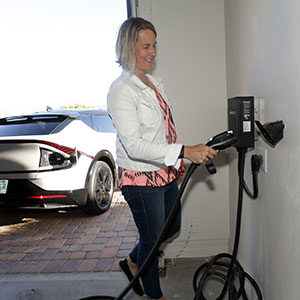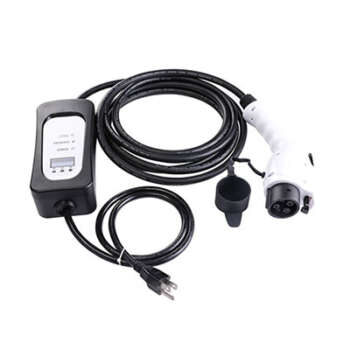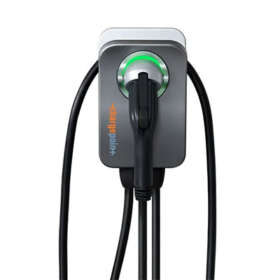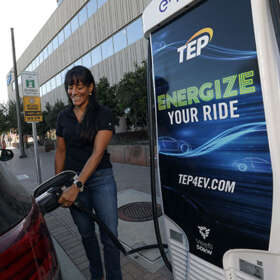EV Charger Rebates
Claim a rebate from UniSource of up to $500 on EV chargers.
UniSource Electric residential customers who purchase a networked* Level 2 electric vehicle (EV) charger can claim a rebate that covers 75% of the initial purchase cost (before tax and after any discounts or other rebates), up to $500.
The rebate will be issued as a credit on the customer's UniSource account. A maximum of two incentives are allowed per premise for each charger purchased for home use with a highway-approved battery electric vehicle or plug-in hybrid electric vehicle.
Program Requirements
To qualify for the rebate, UniSource Electric residential customers must:
- Purchase a new Level 2 or higher networked* EV charger and submit the application within 60 days of the initial purchase date.
- Tesla Mobile Connector, Rivian Portable Charger, WebGo Dual Volt, and other mobile, portable, and dual volt chargers are not eligible.
- Rebates are not offered on used, resold or refurbished chargers.
- Provide a valid proof of purchase, from a local retailer or an online retailer (not to include eBay or other resale sites) that ships the item to the customer’s service address in UniSource’s territory.
- Submit a photo of the serial number on the device itself.
- Be on an active electric Time-of-Use (TOU) rate plan and remain on the plan for a minimum of two years.
- Charger must have ongoing and stable connection to the internet.
- Install the eligible EV charger at their UniSource service address.
Below is a list of EV chargers that qualify for UniSource’s rebate program. Please note, UniSource does not endorse specific brands or manufacturers. We recommend conducting your own research to find an EV charger that best suits your needs.
To inquire about the eligibility of EV chargers not listed below, or for any other questions or concerns, please contact us at EVresidential@uesaz.com

85 percent of EV Charger rebate funds remaining (data updated monthly)
*Networked refers to any electric vehicle charger that can connect remotely to a larger network via the internet. Look for "Smart charger" or "Wi-Fi enabled" tags in the EV charger description or spec sheet before purchasing. A networked EV charger allows the EV driver, the utility (or a third party) to connect to the charger to manage charging.
NOTE: Customer with net metering Rider 4 who meet the requirements for a level 2 networked EV charger must transition to Net Metering Time-of-Use (TOU) rate plan. Please contact the Customer Care Center at uescustomercare@uesaz.com to modify your rate.
Customers agree to allow a UniSource representative to conduct a site visit to verify that the Program Requirements have been met.
Rebate applications must be submitted within 60 days of the initial purchase date to be considered. Incentives are subject to the availability of funding. This program is subject to change or expire without notice. Full rebate details are available on the Electric Vehicle Charger Program Application Form.
Rates for EV Owners
UniSource offers pricing plans that can support battery electric and plug-in hybrid electric vehicle charging.
Super Off-Peak Time-of-Use EV Plan
Lower priced super off-Peak periods, between 10 p.m. and 5 a.m. daily, provide for greater savings.
Demand Super Off-Peak Time-of-Use EV Plan
Lower off-peak rates with on-peak rates and a "demand" charge based on your highest individual hour of usage during on-peak periods.
Time-of-Use Plan
Shift a majority of your usage to off-peak hours and reduce your monthly bill. See savings by charging your vehicle during off-peak times.
Is an EV right for me?
Electric vehicles (EVs) can reduce your fuel and maintenance costs while shrinking your carbon footprint. But as they say: your mileage may vary.

Total: $399.50
Total: $520
* Tax credit amount could be reduced as more EVs are sold. For more details, visit https://www.fueleconomy.gov/feg/taxevb.shtml.
Fuel and mileage estimates based on 15,000 miles driven/year, an average price of $3.50/gallon and the Basic electric rate of $0.12/kWH with no EV rate discounts used. The 2024 Chevy Equinox Gasoline averages 24 miles per gallon in the city and 30 mpg on the highway.
EV Benefits and Incentives
Benefitting your wallet and the environment
No emissions testing
In Arizona, EVs are exempt from all emissions testing requirements.
State tax incentives
State tax incentives also are available, including reduced vehicle license tax.
Charging Your EV

Level 1
- 120-volt (V) plug and can be plugged in to a standard wall outlet. Most plug-in EVs come with this type of charging equipment.
- 2-5 miles of range for each hour of charging.
- Most often used at home.
- Typically used to charge their vehicles at home overnight.

Level 2
- Electric vehicles can be charged with a 240V plug, typically used in homes.
- 10-60 miles of range for each hour of charging.
- These units can fully charge an electric car battery in as little as 2 hours, making them a good choice for both homeowners and businesses.
- Overall home charging satisfaction is highest among EV owners who install a Level 2 permanently mounted charging station.

Level 3
- Direct-current (DC) fast-charging equipment typically found along corridors with heavy traffic and other public locations.
- DC rapid chargers use a 480V connection to provide 60-100 miles of range for each 20-minute charge.
- These chargers require highly specialized equipment to install and maintain and typically are only used in commercial and industrial applications.
Note: Before purchasing an EV charger for your home, you may need to consult an electrical contractor to determine if your home's electrical system needs any modifications. The type of charging system you should install will depend on the type of vehicle you choose. Installation of higher-voltage systems may require permitting and upgrades to your home's electrical facilities.
Charging On the Go
Charging your EV when you're away from home is easy


